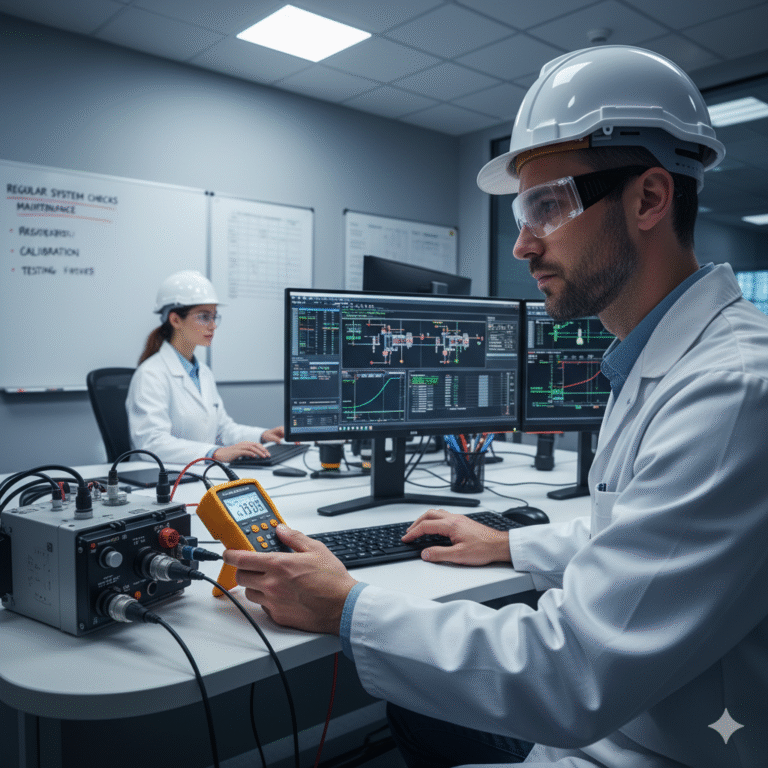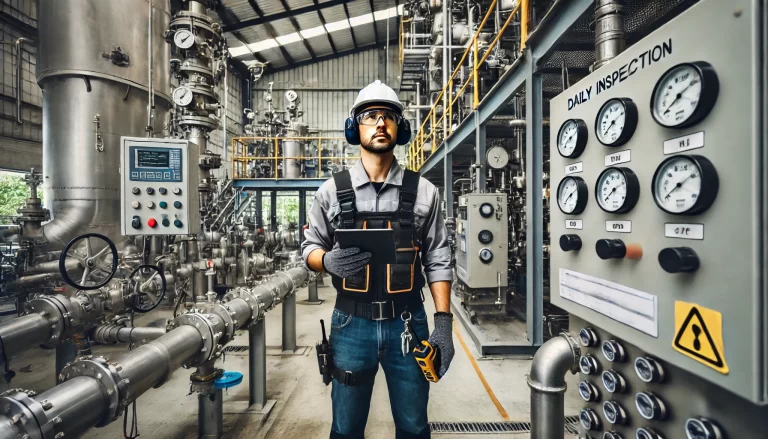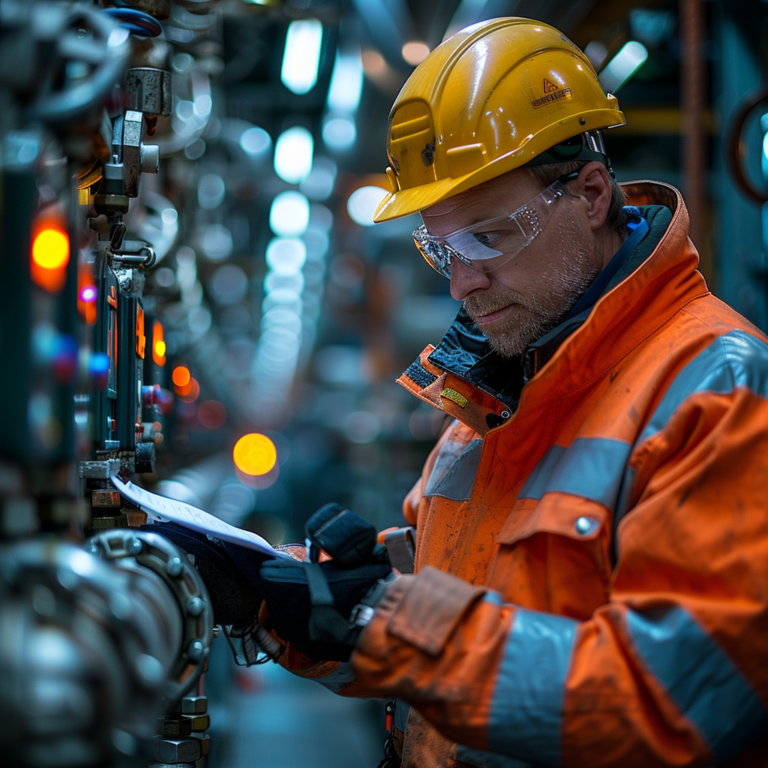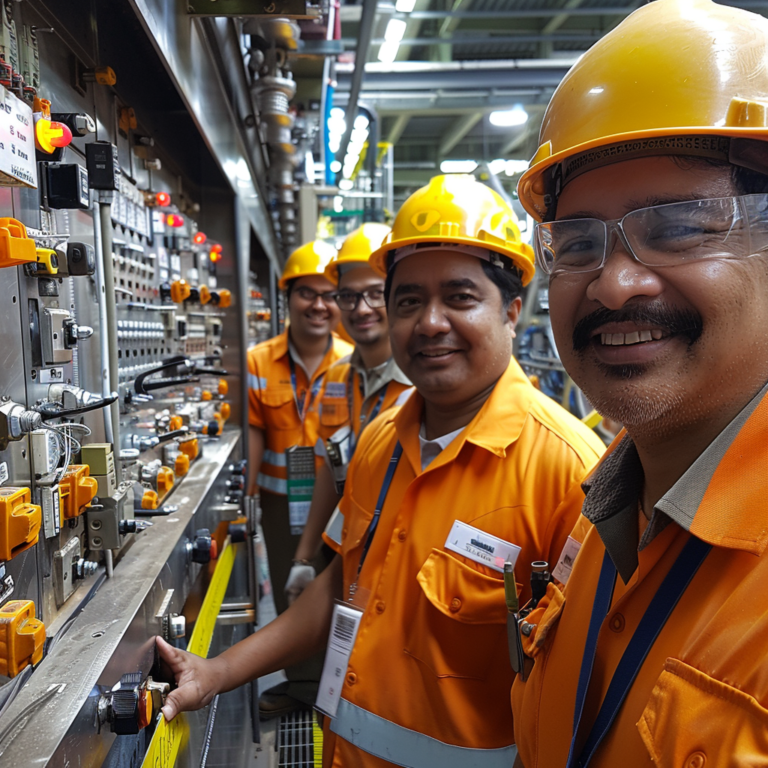An outstanding chemical instrumentation technician is defined by a combination of solid technical knowledge, process adaptation, safety compliance, and efficient collaboration. Excellence in this field requires a multifaceted approach, focusing on continuous improvement across several areas. Below are key directions for becoming an outstanding technician:

1. Mastering Technical Skills: From “Basic Understanding” to “Expertise”
1.1 Instrument Knowledge: Understand Principles, Select Appropriately, and Calibrate Precisely
• Not just knowing the instruments, but understanding the principles, choosing the right one, and fine-tuning:
For instruments such as pressure transmitters, thermocouples, electromagnetic flowmeters, and pH meters, thoroughly grasp their principles, suitable mediums, installation requirements, and calibration methods. For example, choose PTFE-lined electromagnetic flowmeters for corrosive media and armored thermocouples for high-temperature applications.
• Troubleshooting: Develop a systematic approach to fault diagnosis. For example, if a pressure transmitter has no output, start by checking the power supply (24V DC), wiring polarity, impulse tube for blockages, and finally the instrument itself.
• Tools & Standards: Become proficient in using calibration tools (e.g., pressure calibrators, temperature furnaces), multimeters, and oscilloscopes, and understand relevant standards (e.g., GB/T, IEC) for compliance and traceability.
1.2 Control Systems: Bridging the Gap Between Instruments and PLC/DCS
• Understand control system integration: Learn to configure and debug systems such as PLCs (e.g., Siemens S7, Mitsubishi FX) and DCS (e.g., Zhejiang Zhongkong, Yokogawa, Emerson). You should be able to interface instruments with systems via protocols such as Modbus and HART, and troubleshoot logic issues.
• Loop Tuning: Understand PID control theory and adjust parameters based on process needs. For instance, in a reactor temperature control loop, avoid overshooting by adjusting integral time, or optimize flow control loops for rapid response.
• Fault Diagnosis: Distinguish between instrument faults and system issues. For instance, if a DCS displays fluctuating data, check whether the instrument signal is stable first (using a multimeter to measure 4-20mA), followed by checking communication links and system configuration.

2. Process Integration: From “Understanding Instruments” to “Understanding Processes”
An excellent instrumentation technician must not only be able to operate instruments, but also integrate them into the larger process:
• Understand the Process Flow: Familiarize yourself with the production logic of chemical plants (e.g., reaction, distillation, heat exchange, storage), and understand the role of each instrument within the process. For example, the temperature sensor at the top of a distillation column directly affects product purity, requiring attention to response time and measurement accuracy.
• Adapt Instruments to Process Conditions: Select instruments that are compatible with process parameters such as temperature, pressure, and medium characteristics. For example, avoid using orifice flow meters for viscous media, as they are prone to clogging; instead, use target flow meters.
• Contribute to Process Optimization: Use instrumentation data to propose process improvements. For example, by analyzing flow meter data, you can detect pipeline leaks; by studying temperature data, you can optimize heat exchange efficiency.
3. Safety & Compliance: Ensuring Safety Through Risk Mitigation
Safety is non-negotiable in chemical plants due to high temperatures, pressures, flammable, explosive, and toxic conditions:
• Understand Safety Standards: Familiarize yourself with safety regulations, such as explosion-proof standards and chemical instrumentation engineering construction and quality acceptance standards. Instruments in explosive areas must be explosion-proof, with proper sealing to prevent sparks from escaping.
• Follow Standard Operating Procedures: Before any hot work, ensure proper fire permits are in place; verify electrical systems before work and wear safety harnesses when installing instruments at height. When calibrating instruments for toxic media, ensure proper ventilation and personal protective equipment (PPE) is used.
• Focus on Interlock Protection: Safety instrument systems (SIS) are the last line of defense. Regularly test emergency shutdown buttons and pressure switches to ensure they function reliably in emergencies, such as cutting off feedstock or activating pressure relief valves.
• Identify Hazards: During routine inspections, check for abnormal signals, leaks, corrosion, and loose connections. For example, if an instrument’s junction box is flooded or a flange is leaking, address it immediately to prevent process instability or safety accidents.

4. Collaboration & Communication: Enhancing Efficiency Through Teamwork
Instrumentation technicians work closely with many departments. Strong collaboration skills are essential for improving overall efficiency:
• With Process Operators: Establish good communication with operators, who have the most knowledge about on-site conditions. For example, if an instrument displays abnormal readings, ask the operator about potential changes in medium or process adjustments.
• With Maintenance Workers: Clearly define responsibilities when working with maintenance staff. If an instrument malfunction is linked to equipment failure, such as pump vibrations damaging a pressure sensor, work together to identify the root cause.
• With Control Room Operators: Be familiar with the DCS interface and troubleshoot discrepancies between instrument signals and control room data. Be able to quickly determine whether an issue is with the instrument or the system, and update the control room on the progress of resolution.
• With Technical/Design Departments: Participate in the selection and installation discussions for new projects, offering suggestions based on field experience (e.g., positioning of instruments for easier maintenance or optimizing impulse tube routing).

5. Continuous Improvement: Lifelong Learning and Adaptation
As instrumentation technology continues to evolve, staying updated is key:
• Track Technology Trends: Learn about new technologies such as smart instruments (e.g., wireless transmitters, IoT devices), digital transformation (e.g., industrial internet, data analytics), and new control algorithms (e.g., model predictive control).
• Document and Learn from Experience: Maintain a personal fault case database where you record problems, causes, and solutions for future reference. For example, if a radar level gauge’s measurement is inaccurate due to vapor formation in volatile media, you can later suggest using guided wave radar or enlarging the antenna size.
• Pursue Certifications: Consider obtaining certifications such as Chemical Instrumentation Technician or Safety Engineer to enhance professional recognition.
• Keep Up with Industry Standards: Safety and environmental standards are constantly updated in the chemical industry. Stay informed on new regulations (e.g., new environmental monitoring instruments, safety system upgrades) to ensure your work remains compliant.

6. Professionalism: Attention to Detail and Strong Ethics
• Meticulousness: Always document calibration data and commissioning records accurately. For example, a 4-20mA signal calibration error should not exceed ±0.1% FS to avoid process deviations.
• Accountability: Conduct regular inspections without cutting corners. Even instruments in remote areas should be inspected periodically. In the case of an emergency failure (e.g., a lockout triggered by instrumentation), respond quickly and be ready to work through the night if necessary.
• Cost Awareness: When selecting instruments, balance performance with cost-effectiveness. For example, instead of opting for high-end instruments unnecessarily, consider repairing rather than replacing faulty instruments, such as tightening loose instrument wiring instead of replacing the unit.

Summary
An outstanding chemical instrumentation technician is a technical expert, process integrator, safety professional, and collaborator. They combine a solid foundation in instrumentation and control systems with a deep understanding of process requirements, maintain a strong safety mindset, collaborate effectively across departments, and continuously learn to stay updated with technological advancements. By excelling in these areas, you can evolve from a competent technician to an indispensable technical expert who creates value through stable operations, process optimization, and risk reduction.
